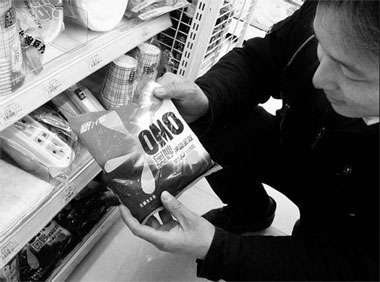Standing before a display in a supermarket on Shanghai's Huaihai Road, Cai Xiufang studies carefully the various packets of detergent.
She wants to make sure the one she buys does not contain phosphorus, which makes her hands itch and causes a rash.
"I'm allergic to it," Cai said. "Although most detergents claim to be phosphorous-free, I still find some of them disagreeable to my hands."
A man looks at a packet of detergent at a store in Shanghai yesterday. The use of phosphorous in such cleaning products is to be banned across the city from next month.
Thankfully for Cai and others like her, a new regulation banning the use of phosphorous in all detergents will soon take effect.
The Shanghai environmental protection bureau announced recently that from next month, the manufacture and sale of detergents containing phosphorus will be banned across the city. The new rule, which follows the introduction of similar measures in the areas around Taihu, Chaohu and Dianchi lakes, is part of a nationwide campaign to address the broader issue of environmental protection, which currently tops the government's agenda.
Wang Qiang, a spokesman for the bureau, said: "High levels of phosphorus and nitrogen are believed to be the major cause of red tides and algae blooms.
"The algae outbreak in Taihu Lake last year is a warning.
"We hope that by putting forward such a proposal, the public's awareness of environmental protection, especially water preservation, will heighten."
The proposal has already won support from the city's Chain Enterprises Association - a regional intermediary organization under the municipal economic commission that promotes the development of commercial chains - as well as 21 retailers and two detergent manufacturers.
The campaign against the use of phosphorus in cleaning products dates back to the late 1990s when authorities in several lake areas took a tough stand against such detergents.
Phosphorus-free washing products are therefore nothing new to Chinese consumers.
"But people's awareness of them needs to be increased," said Wang.
"The government is giving a clear signal with this proposal that more needs to be done in the area of environmental protection, which is a social responsibility for all."
Situated at the mouth of the Yangtze, Shanghai is "at a critical geographical location for the preservation of offshore water resources", Huang Minsheng, a professor with the department of environmental protection at East China Normal University, said in an interview with China Daily.
"Along with industrial waste, urban sewage from household consumption is a major source of pollution," he said.
"By prohibiting the use of phosphorus in detergents, the water quality is certain to improve."
Wang said the central government is also revising the Law on Water Pollution Prevention and Control to further control the discharge of phosphorus into the environment.
(China Daily January 23, 2008)






